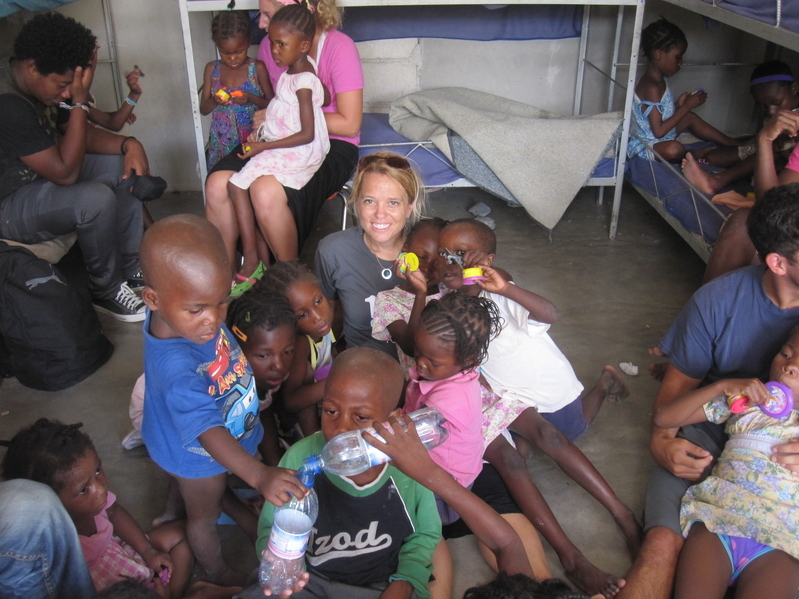
For Beth Guckenberger, founder of Back2Back Ministries, the heartbreaking, life-changing moment happened during a mission trip to Monterrey, Mexico.
"My husband Todd and I were serving at an orphanage. The kids hadn't had meat in a year so we decided to make them hamburgers," she recalled. "I started to notice that the preschoolers kept coming up to get more and more hamburgers before disappearing. I was curious, so I followed them."
"These children," she continued, "were lifting up their mattresses and hiding the burgers underneath them for another day. I called my husband over, and that was a defining moment for both of us. We couldn't unsee that scene, and we knew at that moment we were called to ministry."
In 1997, Guckenberger and her husband saved, took a one-year leave of absence from their jobs and moved from their native Ohio to Mexico to start their own orphanage.
Today, Back2Back Ministries is an international orphan care ministry serving abandoned, orphaned and impoverished children in Mexico, Nigeria, India, and Haiti. The ministry reflects Guckenberger's dedication to her favorite Bible verse, Zechariah 4:10: "Do not despise these small beginnings, for the Lord rejoices to see the work begin."
With numerous locations, Back2Back provides holistic care, meeting each child's spiritual, physical, educational, emotional and social needs. In this way, the organization helps children overcome their life circumstances and break free from the cycle of generational poverty.
This care is accomplished through staff and national partners in each country as well as numerous individuals, churches and corporate partners, over 450 child sponsors and around 2,500 mission trip guests each year.
Guckenberger, who lived in Mexico for 15 years, told The Gospel Herald that Back2Back also trains over 130 organizations, impacting hundreds of thousands of children and allowing them to grow up healthy and stable. But the ministry is no small task, she admitted, as one hundred percent of orphans have been abandoned or abused.
"Training is key," she said. "When you're working with a child from a hard place, often, they've experienced sexual, emotional, and physical trauma, so it can stunt their emotional age. So, you might be looking at an eight-year-old who acts more like a four-year-old. You have to adjust your expectations."
Early on in her ministry, Guckenberger said she didn't understand the unique practices she needed to employ when approaching children coming from hard places.
"We were trying to use traditional methods, and it simply wasn't working," she said. "But thanks to groundbreaking research, we learned how to de-escalate children who had emotional triggers or sensory deprivation. We teach simple best practices; easy things, like bending down to look at a child when talking to them, and saying 'yes' as much as possible and saving 'no' for critical moments. Even looking for moments to say 'yes' allows children to relax."
"When we began to pilot these techniques, we saw tremendous results," she said. "We became passionate about training outside of our own organization, teaching others how to be trauma-informed and aware."
Guckenberger's passion for helping underprivileged children deeply impacts her personal life as well as her professional life: Between biological, foster and adoptive children, she and her husband have raised ten children over the years.
"Blending our children have given us an opportunity for story," she said. "There's nothing more rewarding than I've done, and I wouldn't change any of my stories -- even the ones that have had challenging seasons because I've realized it's God growing me."
"Some of those hard storylines or hard children have been personal guides toward my sanctification because they've exposed my sin and forced to depend on the Lord," she continued. "It's worth it in all ways."
But based on her experience as a missionary, ministry director and parent, Guckenberger is a firm believer in having a "co-missional marriage."
"A child from a hard place is going to demand attention, affection, time, energy, resources," she explained. "If there's not an intentional plan toward making sure the marriage is at the center of that unit and getting what it needs to maintain a heathy sense about it, then the train goes off the rail almost every time. You need accountability, people in the same space as you so you have a good, healthy, self-awareness."
"You need commitment on both sides," she added. "You need to invest in one another in ways that aren't merely transactional. Those kinds of exchanges don't cultivate intimacy. You need to have a shared vision of recognizing, this is a long-play, and we need to live in a way that impacts the long-term health of our family instead of focusing on the immediate process."
Also a gifted storyteller, Guckenberger is also the author of eight books, including adult and children's titles. She told GH that she hopes her work encourages everyone to fulfill their unique, God-given calling -- and realize they can make a difference wherever they are.
"I think in this field, we've often done a huge disservice by telling stories in hyperbole: Sell everything, make your own bread and homeschool. That's simply not realistic for the average person," she said.
There's honor, Guckenberger posited, in the "average story."
"There are opportunities for everyone to raise a hand," she said. "Whether it's making meals for an adoptive family, serving on a short-term mission trip, or being respite providers -- those who go through training to take care of a foster child for a weekend to give families a break -- a little bit of time, resources, and care goes a long way."
To learn more about Back2Back Ministries, visit https://back2back.org.






